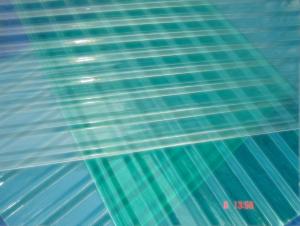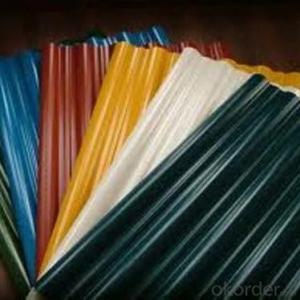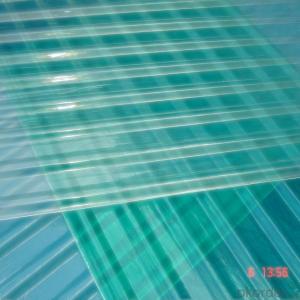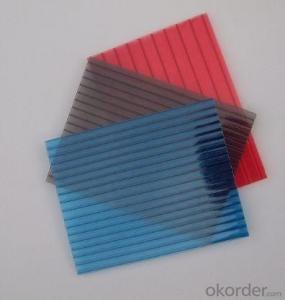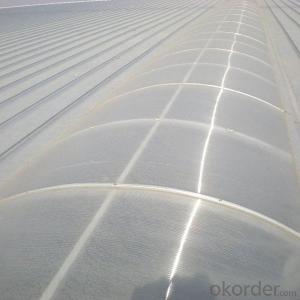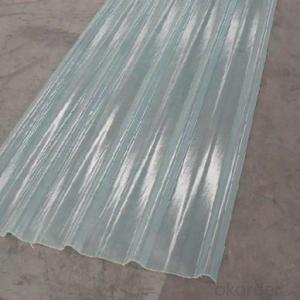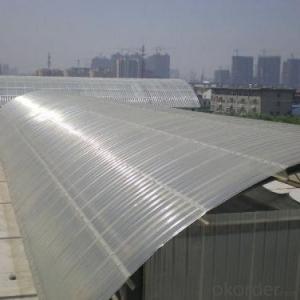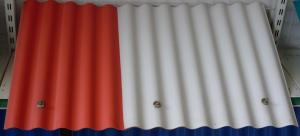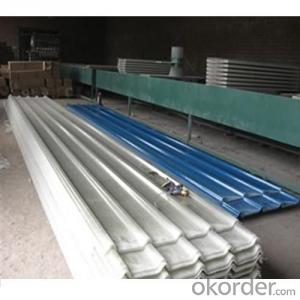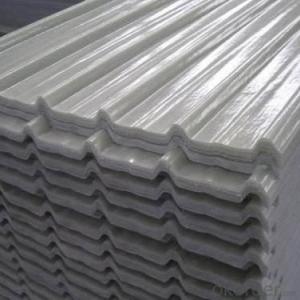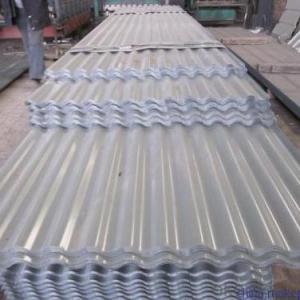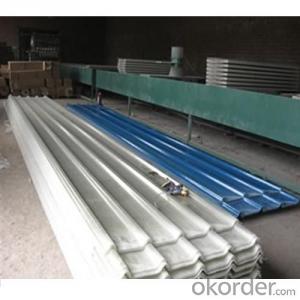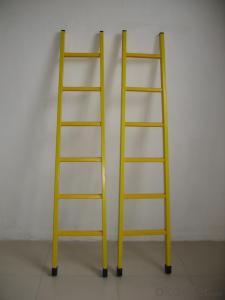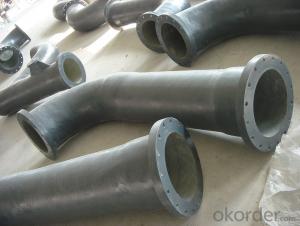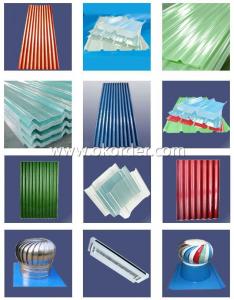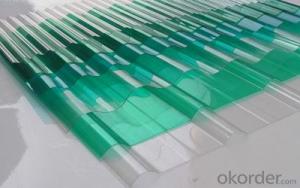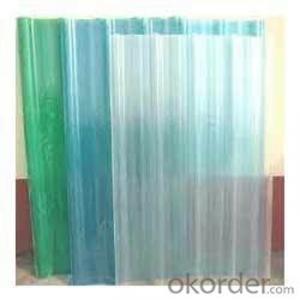FRP Roofing Panel B
- Loading Port:
- China Main Port
- Payment Terms:
- TT or LC
- Min Order Qty:
- 100Pcs m.t.
- Supply Capability:
- 1000Pcs m.t./month
OKorder Service Pledge
OKorder Financial Service
You Might Also Like
Specification of FRP Roofing Panel
Thickness:1.2mm
Color:sky blue, dark blue, clear, light green, dark green, opal, etc.
Ordinary Wave: 760-380
Length:No limit but with the consideration of transportation
Features of FRP Roofing Panel:
1) The fiberglass content of new generation greenhouse panel has been improved by 18.3%
2) Weather resistant and Self-clean ability
3) Excellent yellowness resistance
4) Strong impact resistant and low bending rate
5)Withstand extreme temperature from -38 degree to +110 degree for a long time
6) Aging resistant: specified F4 film added on surface and gel coat makes it endurable
for long.
7) More strengthened, safer, cleaner and more economical greenhouse panel.
8) Mainly serve the big factory, warehouse, super markets and other steel-structured project.
Packaging & Delivery
Packaging Detail: standard packing for export
Delivery Detail:3~7 days
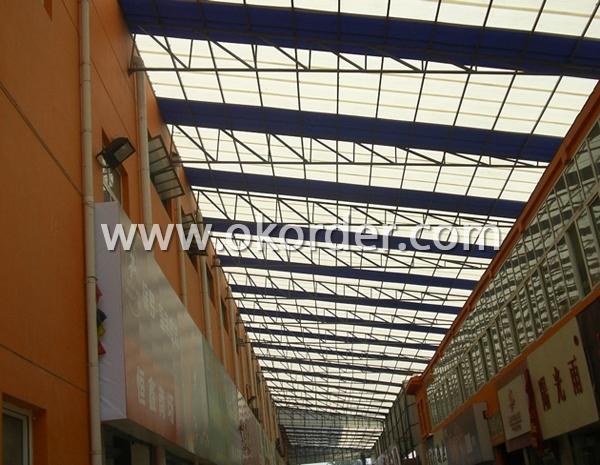
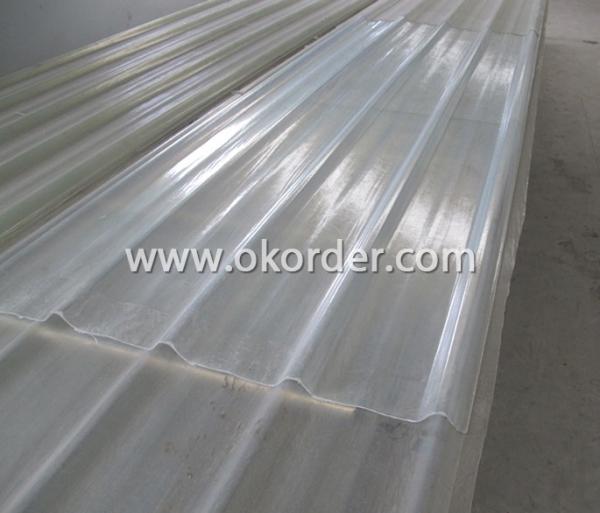
- Q:Are FRP roofing panels resistant to pests and insects?
- Yes, FRP (Fiberglass Reinforced Plastic) roofing panels are generally resistant to pests and insects. FRP panels are made of a composite material that is not attractive to pests and insects, such as termites, ants, and beetles. Additionally, FRP panels are manufactured in a way that does not provide any gaps or crevices where pests and insects can enter or nest. This makes FRP roofing panels an excellent choice for preventing infestations and damage caused by pests and insects.
- Q:Can FRP roofing panels be installed on curved surfaces?
- Yes, FRP (Fiberglass Reinforced Plastic) roofing panels can be installed on curved surfaces. FRP panels are flexible and can be easily shaped to fit the contours of curved roofs. The panels can be bent and molded to match the desired curve, ensuring a seamless and secure installation. However, it is important to note that the degree of curvature may affect the size and shape of the panels required, and additional considerations such as proper support and fastening methods may be necessary to ensure the panels are securely attached to the curved surface. It is recommended to consult with a professional installer or manufacturer for specific guidance on installing FRP roofing panels on curved surfaces.
- Q:Are FRP roofing panels resistant to damage from chemicals or pollutants?
- Yes, FRP (Fiberglass Reinforced Plastic) roofing panels are highly resistant to damage from chemicals or pollutants. FRP panels are constructed using a combination of fiberglass and plastic resin, which provides excellent resistance to corrosion, chemical exposure, and other environmental pollutants. This resistance makes FRP roofing panels an ideal choice for industries or environments where the roof may be subjected to chemical spills, fumes, or other harmful substances. Additionally, FRP roofing panels are also UV resistant, meaning they can withstand prolonged exposure to sunlight without deteriorating or losing their structural integrity. Overall, FRP roofing panels offer a durable and long-lasting solution that can withstand the damaging effects of chemicals or pollutants, ensuring the protection and longevity of the roof.
- Q:Can FRP roofing panels be used for both new construction and roof replacements?
- FRP roofing panels are suitable for new construction as well as roof replacements. They can be easily installed on different types of structures, such as residential, commercial, and industrial buildings. These panels are lightweight, durable, and have exceptional weather resistance, making them ideal for new roofs or replacing old or damaged ones. Moreover, their low maintenance requirements and simplicity of installation make FRP panels a cost-effective choice for any construction or replacement endeavor.
- Q:Can FRP roofing panels be installed on steep-sloped roofs?
- Indeed, it is possible to install FRP (Fiberglass Reinforced Plastic) roofing panels on roofs with steep slopes. These panels are highly adaptable and can serve various roofing purposes, including steep-sloped roofs. Nevertheless, it is crucial to adhere to appropriate installation methods and safety measures. Dealing with steep-sloped roofs poses additional difficulties due to the heightened danger of falling and the necessity for specialized equipment. To guarantee a secure and prosperous installation, it is advisable to seek advice from a skilled roofing contractor who possesses expertise in the installation of FRP panels on steep-sloped roofs.
- Q:Are FRP roofing panels resistant to wind uplift?
- Yes, FRP roofing panels are generally resistant to wind uplift. The fiberglass-reinforced plastic material provides high strength and durability, making it capable of withstanding strong winds and reducing the risk of uplift or damage to the roofing system.
- Q:Are FRP roofing panels suitable for hospitals?
- Yes, FRP (Fiberglass Reinforced Plastic) roofing panels are suitable for hospitals. They are lightweight, durable, and resistant to corrosion, making them an excellent choice for healthcare facilities. FRP panels also offer good insulation properties and can withstand harsh weather conditions. Additionally, they are easy to clean and maintain, which is crucial in a hospital environment where hygiene is of utmost importance.
- Q:Can FRP roofing panels reduce energy costs?
- FRP roofing panels have the ability to lower energy costs. Known for their exceptional insulation properties, FRP roofing panels possess a high R-value, a measure of a material's thermal resistance. Consequently, these panels effectively prevent the transfer of heat from the outside to the inside and vice versa, thus maintaining a consistent and comfortable temperature within the building. By minimizing heat transfer, FRP roofing panels significantly diminish the requirement for heating and cooling systems, leading to reduced energy consumption and associated costs. In warmer climates, these panels reflect sunlight and prevent excessive heat from infiltrating the building, resulting in reduced cooling needs. In colder climates, the insulation properties of FRP panels aid in retaining heat generated by heating systems, thereby decreasing the need for continuous heating. Furthermore, FRP roofing panels exhibit impressive durability and longevity. They possess resistance to weathering and UV radiation, factors that typically cause deterioration and diminish their energy-saving capabilities over time. This durability ensures that these panels will continue to provide insulation and save energy costs for numerous years, ultimately making them a cost-effective option in the long term. In summary, FRP roofing panels fulfill a significant role in minimizing energy costs by offering outstanding insulation and reducing reliance on heating and cooling systems.
- Q:Are FRP roofing panels suitable for industrial buildings?
- Indeed, industrial buildings can benefit from the suitability of FRP (Fiberglass Reinforced Plastic) roofing panels. Renowned for their durability, strength, and ability to withstand diverse weather conditions, these panels are an ideal choice for industrial structures. Not only are they lightweight, but they also possess a robustness that facilitates easy installation and reduces the burden on the structure. Moreover, FRP roofing panels possess excellent thermal insulation properties, thereby contributing to energy efficiency within industrial buildings. Furthermore, they exhibit resistance towards corrosion, chemicals, and UV radiation, guaranteeing a lengthy lifespan and minimal maintenance requirements. All in all, FRP roofing panels offer a reliable and cost-effective solution for industrial buildings, ensuring durability, weather resistance, and energy efficiency.
- Q:Can FRP roofing panels be used in swimming pool enclosures?
- Yes, FRP (Fiberglass Reinforced Plastic) roofing panels can be used in swimming pool enclosures. FRP panels are known for their durability, strength, and resistance to corrosion, making them a suitable choice for pool enclosures. They are lightweight, easy to install, and can withstand the harsh environmental conditions that often exist in pool areas, such as high humidity, exposure to chlorine, and fluctuating temperatures. Additionally, FRP panels can be customized to meet specific design requirements and are available in various colors and finishes, allowing for aesthetic flexibility. Overall, FRP roofing panels are a reliable option for swimming pool enclosures, providing long-lasting protection and a visually pleasing appearance.
1. Manufacturer Overview |
|
|---|---|
| Location | Shanghai, China |
| Year Established | 1999 |
| Annual Output Value | Above US$ 300,000 |
| Main Markets | Mid East; Eastern Europe; North America |
| Company Certifications | ISO 9002:2000 |
2. Manufacturer Certificates |
|
|---|---|
| a) Certification Name | |
| Range | |
| Reference | |
| Validity Period | |
3. Manufacturer Capability |
|
|---|---|
| a)Trade Capacity | |
| Nearest Port | Shanghai |
| Export Percentage | 41% - 50% |
| No.of Employees in Trade Department | 100 People |
| Language Spoken: | Chinese |
| b)Factory Information | |
| Factory Size: | Above 100,000 square meters |
| No. of Production Lines | Above 5 |
| Contract Manufacturing | OEM Service Offered; Design Service Offered |
| Product Price Range | Average |
Send your message to us
FRP Roofing Panel B
- Loading Port:
- China Main Port
- Payment Terms:
- TT or LC
- Min Order Qty:
- 100Pcs m.t.
- Supply Capability:
- 1000Pcs m.t./month
OKorder Service Pledge
OKorder Financial Service
Similar products
New products
Hot products
Hot Searches
Related keywords
